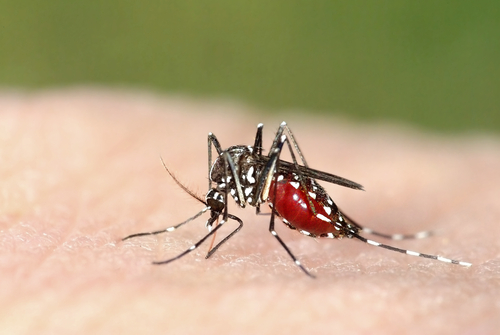
Photo: Shutterstock
When the monsoon rains come, relief from the heat is not all that they bring. Illness and disease also go hand-in-hand with the wet weather. One of the most common and serious diseases associated with this season is dengue fever. Knowing the symptoms, treatment and preventive measures for dengue is essential to keep yourself and your family healthy. Here’s our quick guide to curbing, identifying and treating the disease.
Dengue is a disease caused by one of four viruses that are transmitted to humans by the bite of an infected mosquito. Dengue hemorrhagic fever (DHF) is a more dangerous type of dengue that can be fatal if not treated properly and on time.
Dengue is only spread through mosquito bites, it is not transmitted directly from human to human. A mosquito that sucks the blood from an infected person, whether or not that person is showing symptoms, can then transmit the virus to someone else up to seven days later.
What to watch out for
One good thing about dengue, if you want to see it that way, is that its effects tend to be milder on young children and those who are infected for the first time. Older children and adults usually get more serious infections and display stronger symptoms. These are the symptoms to watch out for:
- High fever (anything over 102 (38.9 C) is a cause of concern, but do see a doctor if it goes over 103 F (39.4 C)
- Headache, with intense pain behind the eyes
- Muscle
 joint and bone pain
joint and bone pain - Bleeding nose and gums
In many cases, it may be difficult to tell dengue apart from the flu, although the seasonal flu does not usually cause bleeding like dengue. Most of the time that may not matter because the treatment is the same. It is important to make sure the patient is well hydrated during the first 2-3 days and through the course of the illness. If it is dengue, there a risk that the illness may get more serious and turn to dengue hemorrhagic fever.
Dengue hemorrhagic fever symptoms
In the more severe form of dengue, fever usually lasts between two and seven days with symptoms similar to those above. However, after the fever eases, other symptoms may arise within 24 hours such as constant vomiting, abdominal pain and difficulty breathing. This is a crucial period where professional medical care is of utmost importance as the body’s circulatory system can fail and the patient can go into shock (a condition where the organs don’t get enough blood or oxygen), followed by death, if not treated properly.
If a person is showing signs of dengue hemorrhagic fever, get them to a hospital right away.
Treatment
There is still no specific medication to treat dengue or DHF. It is usually managed by using pain relievers containing paracetamol. Painkillers that contain aspirin should be avoided, and never given to children. Patients should seek medical advice at the earliest, make sure they get a lot of rest and drink plenty of fluids.
After the fever lets up, if within 24 hours the sufferer feels even worse and starts vomiting and complaining of abdominal pain, take them to the hospital immediately to be checked and treated. DHF is usually treated by fluid replacement therapy in case of early diagnosis. But the patient needs to be hospitalized under all circumstances.
Prevention
Avoiding mosquito bites is the only form of personal protection against dengue. To the extent possible, stay away from areas where mosquitos congregate, put mesh covers on windows, fill in cracks and openings in the outside walls, and use mosquito repellent. Studies show that the only effective repellents are ones that contain at least 20% DEET.
The elimination of breeding spaces for mosquitoes is the best way to prevent the spread of dengue. Try to get rid of areas where mosquito are prone to laying eggs such as open containers that hold rain or other stagnant water. Pet bowls and vases too should be cleaned regularly to get rid of mosquito eggs and larvae, thereby preventing an increase in the mosquito population in the area.
Share your thoughts or questions below. Please like FamiLife’s page on Facebook so that you get all our articles and others may find us.
Disclaimer: Medical content and advice published on this site is provided for information purposes only and is not a substitute for a consultation with a licensed physician or the reader’s discretion. Although FamiLife.in verifies all information with reputable sources, the contributors and publishers accept no responsibility for any actions taken by readers based on the information provided here. FamiLife.in recommends that you always consult a licensed medical professional in health matters.

